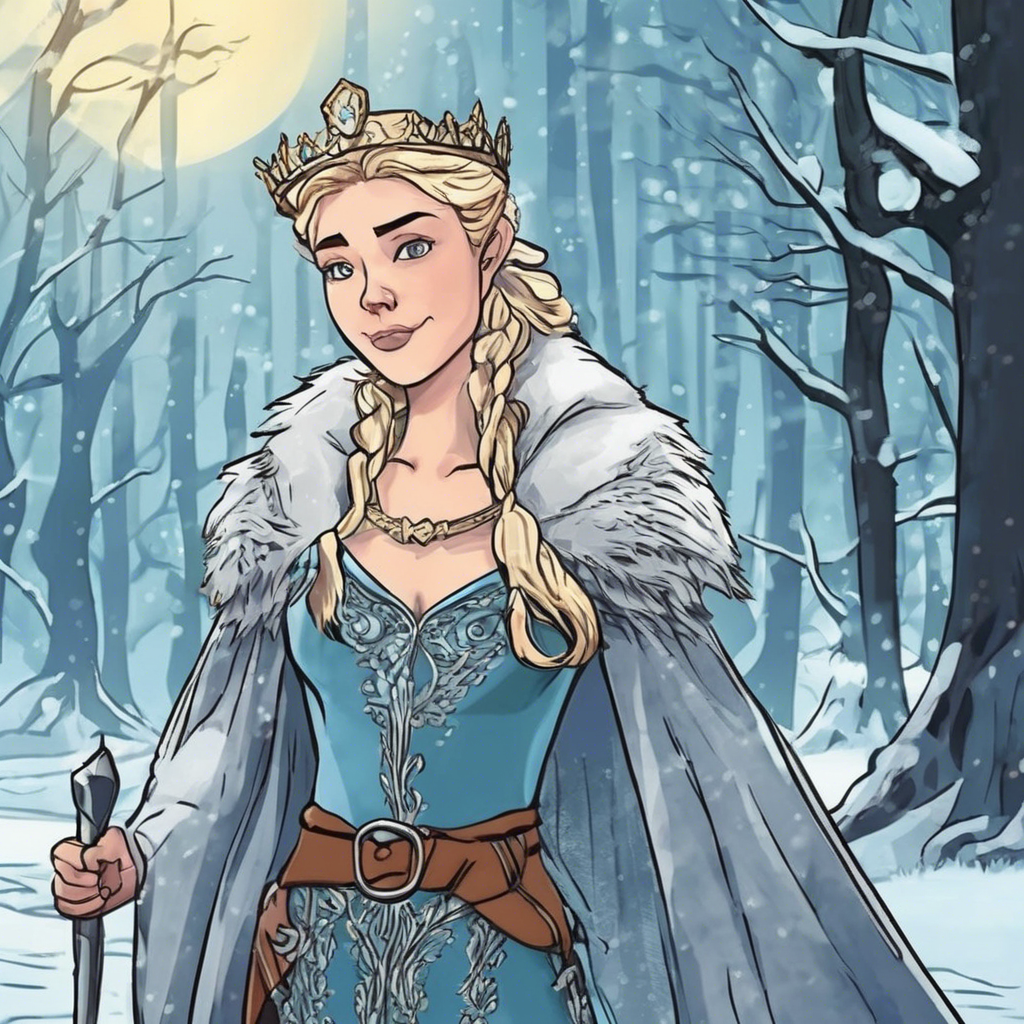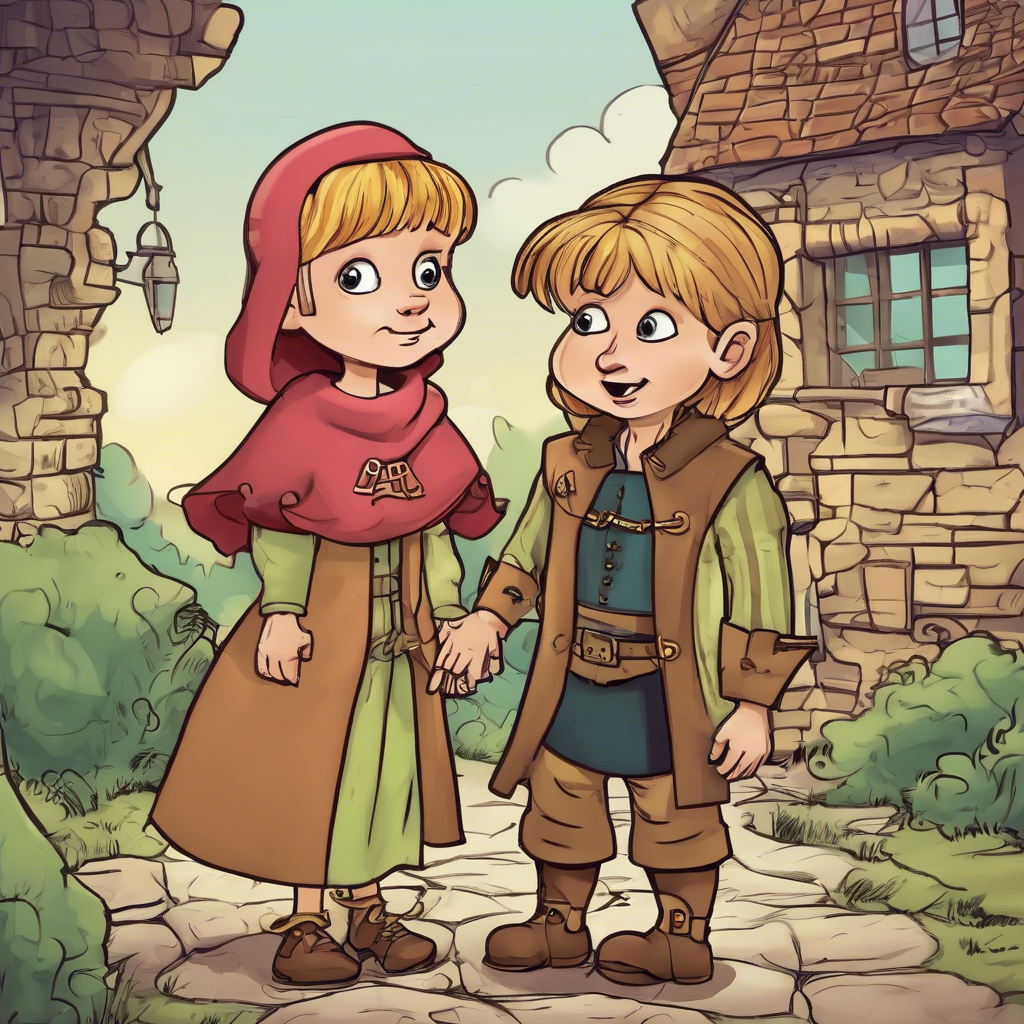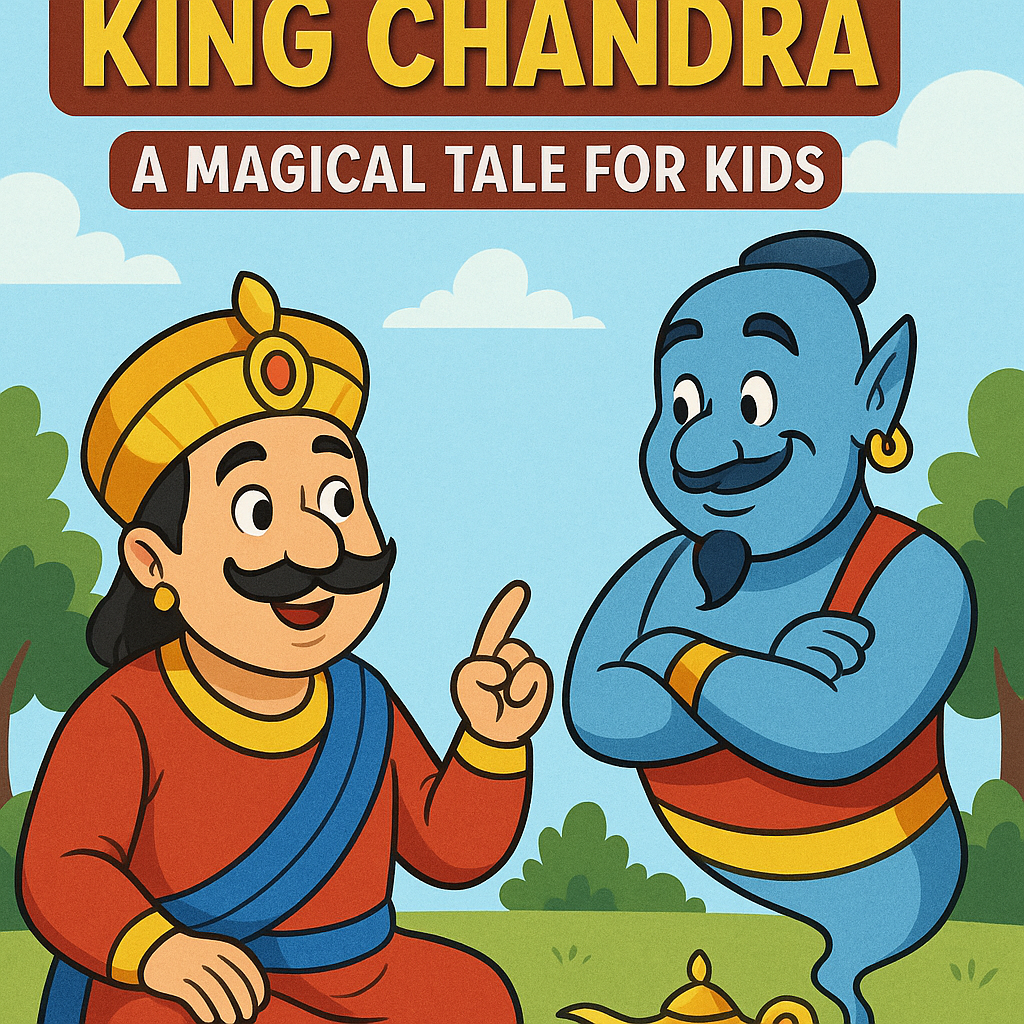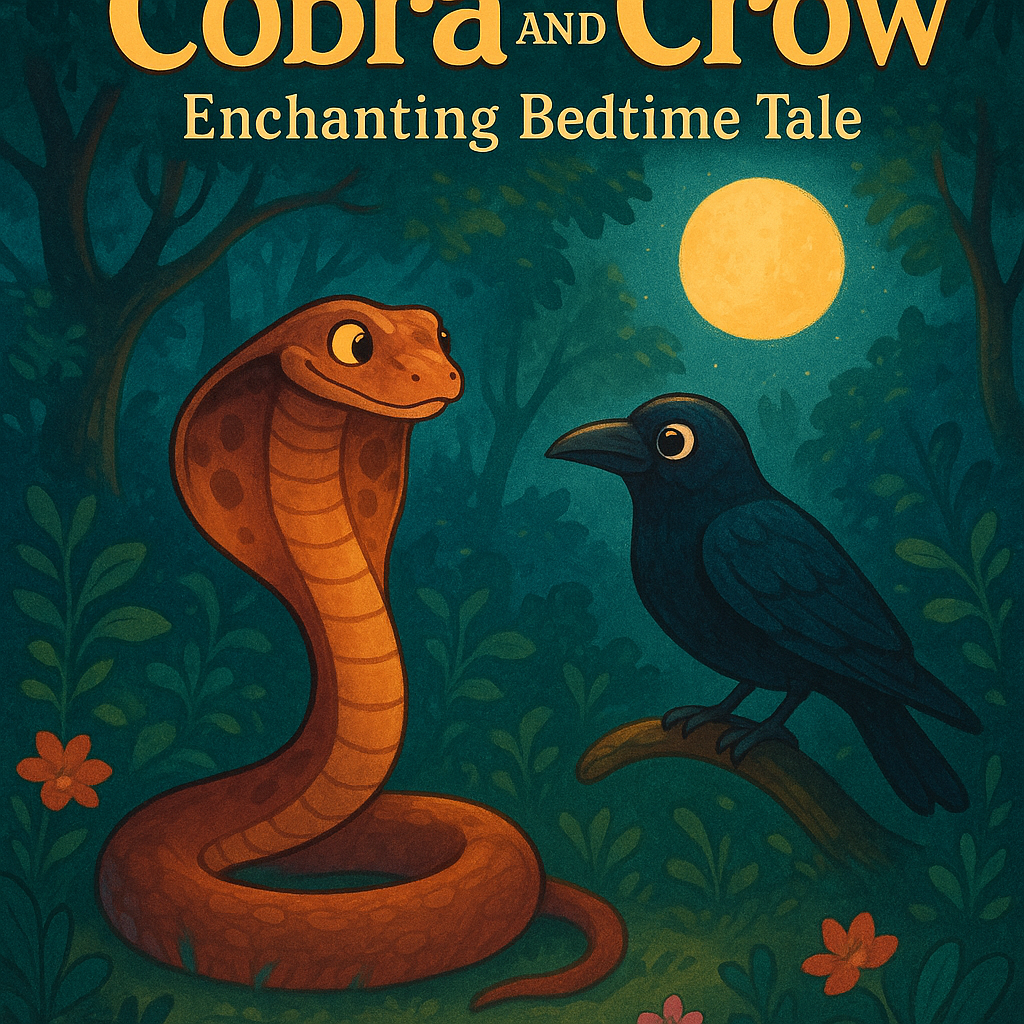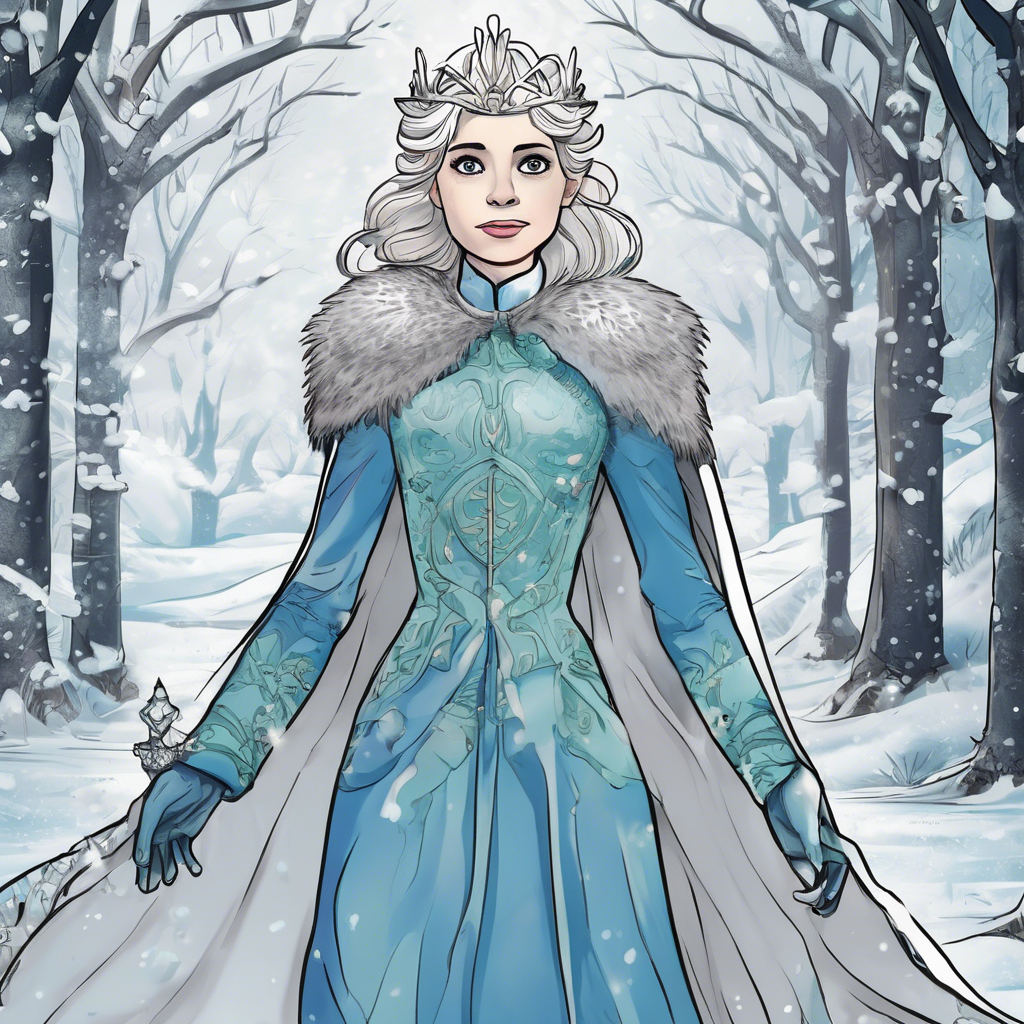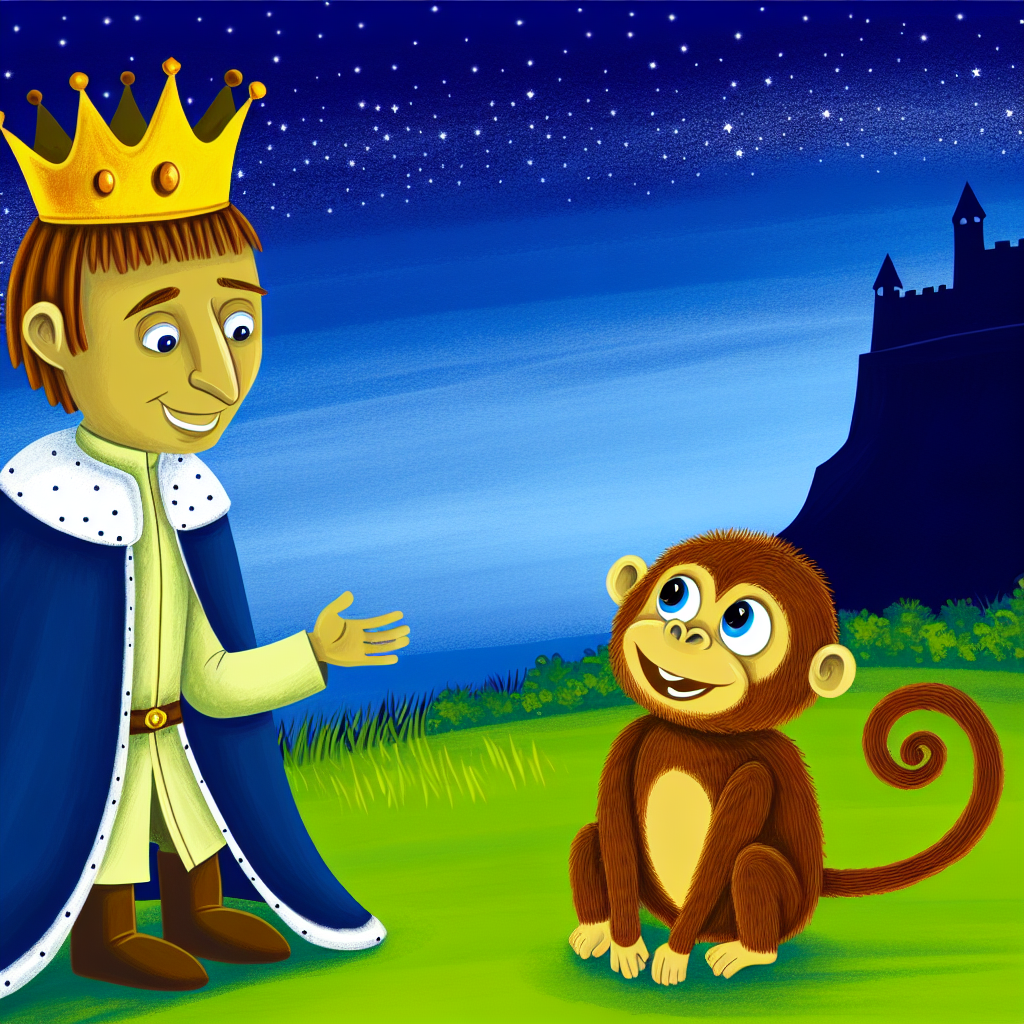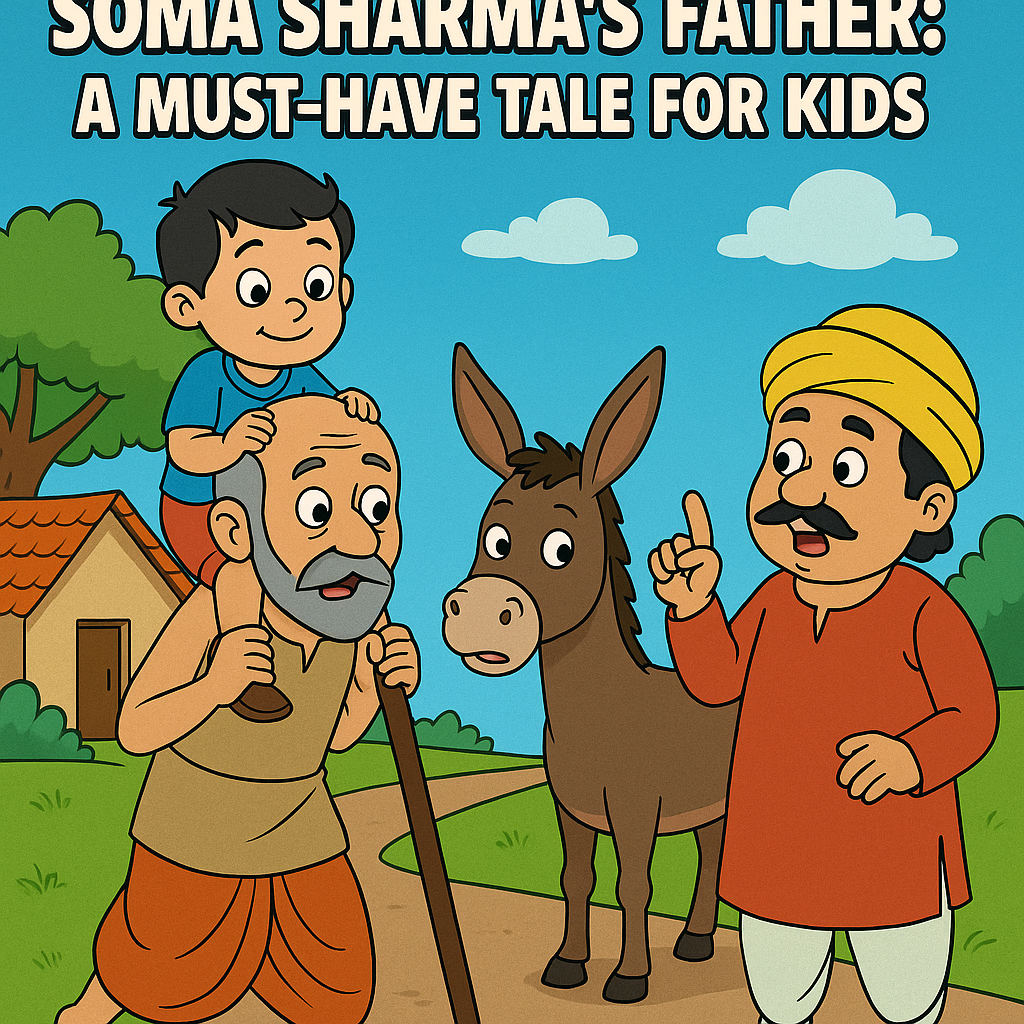FOURTH STORY:
THE PRINCE AND PRINCESS
Gerda was obliged to rest again, and just opposite the place where she sat she saw a great crow come hopping toward her across the snow. He stood looking at her for some time, and then he wagged his head and said, “Caw, caw, good day, good day.” He pronounced the words as plainly as he could, because he meant to be kind to the little girl, and then he asked her where she was going all alone in the wide world.
The word “alone” Gerda understood very well and felt how much it expressed. So she told the crow the whole story of her life and adventures and asked him if he had seen little Kay.
The crow nodded his head very gravely and said, “Perhaps I have—it may be.”
“No! Do you really think you have?” cried little Gerda, and she kissed the crow and hugged him almost to death, with joy.
“Gently, gently,” said the crow. “I believe I know. I think it may be little Kay; but he has certainly forgotten you by this time, for the princess.”
“Does he live with a princess?” asked Gerda.
“Yes, listen,” replied the crow; “but it is so difficult to speak your language. If you understand the crows’ language, then I can explain it better. Do you?”
“No, I have never learned it,” said Gerda, “but my grandmother understands it, and used to speak it to me. I wish I had learned it.”
“It does not matter,” answered the crow. “I will explain as well as I can, although it will be very badly done”; and he told her what he had heard.
“In this kingdom where we now are,” said he, “there lives a princess who is so wonderfully clever that she has read all the newspapers in the world—and forgotten them too, although she is so clever.
“A short time ago, as she was sitting on her throne, which people say is not such an agreeable seat as is often supposed, she began to sing a song which commences with these words:
Why should I not be married?
‘Why not, indeed?’ said she, and so she determined to marry if she could find a husband who knew what to say when he was spoken to, and not one who could only look grand, for that was so tiresome. She assembled all her court ladies at the beat of the drum, and when they heard of her intentions they were very much pleased.
“‘We are so glad to hear of it,’ said they. ‘We were talking about it ourselves the other day.’
“You may believe that every word I tell you is true,” said the crow, “for I have a tame sweetheart who hops freely about the palace, and she told me all this.”
Of course his sweetheart was a crow, for “birds of a feather flock together,” and one crow always chooses another crow.
“Newspapers were published immediately with a border of hearts and the initials of the princess among them. They gave notice that every young man who was handsome was free to visit the castle and speak with the princess, and those who could reply loud enough to be heard when spoken to were to make themselves quite at home at the palace, and the one who spoke best would be chosen as a husband for the princess.
“Yes, yes, you may believe me. It is all as true as I sit here,” said the crow.
“The people came in crowds. There was a great deal of crushing and running about, but no one succeeded either on the first or the second day. They could all speak very well while they were outside in the streets, but when they entered the palace gates and saw the guards in silver uniforms and the footmen in their golden livery on the staircase and the great halls lighted up, they became quite confused. And when they stood before the throne on which the princess sat they could do nothing but repeat the last words she had said, and she had no particular wish to hear her own words over again. It was just as if they had all taken something to make them sleepy while they were in the palace, for they did not recover themselves nor speak till they got back again into the street. There was a long procession of them, reaching from the town gate to the palace.
“I went myself to see them,” said the crow. “They were hungry and thirsty, for at the palace they did not even get a glass of water. Some of the wisest had taken a few slices of bread and butter with them, but they did not share it with their neighbors; they thought if the others went in to the princess looking hungry, there would be a better chance for themselves.”
“But Kay! tell me about little Kay!” said Gerda. “Was he among the crowd?”
“Stop a bit; we are just coming to him. It was on the third day that there came marching cheerfully along to the palace a little personage without horses or carriage, his eyes sparkling like yours. He had beautiful long hair, but his clothes were very poor.”
“That was Kay,” said Gerda, joyfully. “Oh, then I have found him!” and she clapped her hands.
“He had a little knapsack on his back,” added the crow.
“No, it must have been his sledge,” said Gerda, “for he went away with it.”
“It may have been so,” said the crow; “I did not look at it very closely. But I know from my tame sweetheart that he passed through the palace gates, saw the guards in their silver uniform and the servants in their liveries of gold on the stairs, but was not in the least embarrassed.
“‘It must be very tiresome to stand on the stairs,’ he said. ‘I prefer to go in.’
“The rooms were blazing with light; councilors and ambassadors walked about with bare feet, carrying golden vessels; it was enough to make any one feel serious. His boots creaked loudly as he walked, and yet he was not at all uneasy.”
“It must be Kay,” said Gerda; “I know he had new boots on. I heard them creak in grandmother’s room.”
“They really did creak,” said the crow, “yet he went boldly up to the princess herself, who was sitting on a pearl as large as a spinning wheel. And all the ladies of the court were present with their maids and all the cavaliers with their servants, and each of the maids had another maid to wait upon her, and the cavaliers’ servants had their own servants as well as each a page. They all stood in circles round the princess, and the nearer they stood to the door the prouder they looked. The servants’ pages, who always wore slippers, could hardly be looked at, they held themselves up so proudly by the door.”
“It must be quite awful,” said little Gerda; “but did Kay win the princess?”
“If I had not been a crow,” said he, “I would have married her myself, although I am engaged. He spoke as well as I do when I speak the crows’ language. I heard this from my tame sweetheart. He was quite free and agreeable and said he had not come to woo the princess, but to hear her wisdom. And he was as pleased with her as she was with him.”
“Oh, certainly that was Kay,” said Gerda; “he was so clever; he could work mental arithmetic and fractions. Oh, will you take me to the palace?”
“It is very easy to ask that,” replied the crow, “but how are we to manage it? However, I will speak about it to my tame sweetheart and ask her advice, for, I must tell you, it will be very difficult to gain permission for a little girl like you to enter the palace.”
“Oh, yes, but I shall gain permission easily,” said Gerda, “for when Kay hears that I am here he will come out and fetch me in immediately.”
“Wait for me here by the palings,” said the crow, wagging his head as he flew away.
It was late in the evening before the crow returned. “Caw, caw!” he said; “she sends you greeting, and here is a little roll which she took from the kitchen for you. There is plenty of bread there, and she thinks you must be hungry. It is not possible for you to enter the palace by the front entrance. The guards in silver uniform and the servants in gold livery would not allow it. But do not cry; we will manage to get you in. My sweetheart knows a little back staircase that leads to the sleeping apartments, and she knows where to find the key.”
Then they went into the garden, through the great avenue, where the leaves were falling one after another, and they could see the lights in the palace being put out in the same manner. And the crow led little Gerda to a back door which stood ajar. Oh! how her heart beat with anxiety and longing; it was as if she were going to do something wrong, and yet she only wanted to know where little Kay was.
“It must be he,” she thought, “with those clear eyes and that long hair.”
She could fancy she saw him smiling at her as he used to at home when they sat among the roses. He would certainly be glad to see her, and to hear what a long distance she had come for his sake, and to know how sorry they had all been at home because he did not come back. Oh, what joy and yet what fear she felt!
They were now on the stairs, and in a small closet at the top a lamp was burning. In the middle of the floor stood the tame crow, turning her head from side to side and gazing at Gerda, who curtsied as her grandmother had taught her to do.
“My betrothed has spoken so very highly of you, my little lady,” said the tame crow. “Your story is very touching. If you will take the lamp, I will walk before you. We will go straight along this way; then we shall meet no one.”
“I feel as if somebody were behind us,” said Gerda, as something rushed by her like a shadow on the wall; and then it seemed to her that horses with flying manes and thin legs, hunters, ladies and gentlemen on horseback, glided by her like shadows.
“They are only dreams,” said the crow; “they are coming to carry the thoughts of the great people out hunting. All the better, for if their thoughts are out hunting, we shall be able to look at them in their beds more safely. I hope that when you rise to honor and favor you will show a grateful heart.”
“You may be quite sure of that,” said the crow from the forest.
They now came into the first hall, the walls of which were hung with rose-colored satin embroidered with artificial flowers. Here the dreams again flitted by them, but so quickly that Gerda could not distinguish the royal persons. Each hall appeared more splendid than the last. It was enough to bewilder one. At length they reached a bedroom. The ceiling was like a great palm tree, with glass leaves of the most costly crystal, and over the center of the floor two beds, each resembling a lily, hung from a stem of gold. One, in which the princess lay, was white; the other was red. And in this Gerda had to seek for little Kay.
She pushed one of the red leaves aside and saw a little brown neck. Oh, that must be Kay! She called his name loudly and held the lamp over him. The dreams rushed back into the room on horseback. He woke and turned his head round—it was not little Kay! The prince was only like him; still he was young and pretty. Out of her white-lily bed peeped the princess, and asked what was the matter. Little Gerda wept and told her story, and all that the crows had done to help her.
“You poor child,” said the prince and princess; then they praised the crows, and said they were not angry with them for what they had done, but that it must not happen again, and that this time they should be rewarded.
“Would you like to have your freedom?” asked the princess, “or would you prefer to be raised to the position of court crows, with all that is left in the kitchen for yourselves?”
Then both the crows bowed and begged to have a fixed appointment; for they thought of their old age, and it would be so comfortable, they said, to feel that they had made provision for it.
And then the prince got out of his bed and gave it up to Gerda—he could not do more—and she lay down. She folded her little hands and thought, “How good everybody is to me, both men and animals”; then she closed her eyes and fell into a sweet sleep. All the dreams came flying back again to her, looking like angels now, and one of them drew a little sledge, on which sat Kay, who nodded to her. But all this was only a dream. It vanished as soon as she awoke.
The following day she was dressed from head to foot in silk and velvet and invited to stay at the palace for a few days and enjoy herself; but she only begged for a pair of boots and a little carriage and a horse to draw it, so that she might go out into the wide world to seek for Kay.
And she obtained not only boots but a muff, and was neatly dressed; and when she was ready to go, there at the door she found a coach made of pure gold with the coat of arms of the prince and princess shining upon it like a star, and the coachman, footman, and outriders all wearing golden crowns upon their heads. The prince and princess themselves helped her into the coach and wished her success.
The forest crow, who was now married, accompanied her for the first three miles; he sat by Gerda’s side, as he could not bear riding backwards. The tame crow stood in the doorway flapping her wings. She could not go with them, because she had been suffering from headache ever since the new appointment, no doubt from overeating. The coach was well stored with sweet cakes, and under the seat were fruit and gingerbread nuts.
“Farewell, farewell,” cried the prince and princess, and little Gerda wept, and the crow wept; and then, after a few miles, the crow also said farewell, and this parting was even more sad. However he flew to a tree and stood flapping his black wings as long as he could see the coach, which glittered like a sunbeam.

